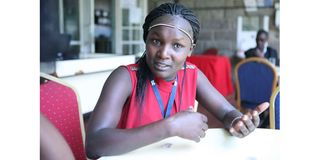Drought, insecurity derailing anti-FGM campaign

Anti-FGM campaigner and founder of I-Am Responsible Foundation Domtila Chesang'.
What you need to know:
- Gender and anti-FGM crusaders in the Rift Valley region have cited drought and insecurity as the major calamities impeding the ongoing campaign to eliminate FGM by the end of this year.
- They have reported a spike in the threat of FGM as young girls are pulled from school to join their nomadic families.
The ongoing drought and insecurity in some parts of the country have been blamed for derailing the fight against Female Genital Mutilation (FGM).
A section of gender and anti-FGM crusaders in the Rift Valley region have cited the two as the major calamities impeding the ongoing campaign to eliminate FGM by the end of this year.
The campaign is being spearheaded by the Anti-FGM Board and the Ministry of Public Service and Gender.
Local groups have reported a spike in the threat of FGM as young girls are pulled from school to join their nomadic families.
Domtila Chesang’ the founder of I-Am Responsible Foundation, an organisation that champions against FGM and child marriages in West-Pokot, told nation.africa that drought and insecurity has kept many girls are out of school, putting them at the risk of being subjected to the cut.
“The only escape for girls in the region from undergoing FGM is being in schools and with many of them being closed due to the ravaging drought and insecurity, they are now at risk of being cut. There is a need for the government to deal with the insecurity menace even as we pray to God to bring the rains,” said Ms Chesang.
Bride price
The anti-FGM champion added that cases of girls being married off for bride price to help families survive the drought, have also become common.
“With many animals dying due to famine and others being stolen through cattle rustling, the only way to acquire wealth for families is to marry off their girls who sadly have to first undergo FGM. The dowry paid helps them to acquire more cattle, goats and money to buy foodstuff,” she said.
She revealed that her organisation has put 27 girls from drought stricken areas in safe shelters, to prevent them from being forced to undergo the cut.
The organisation is also spearheading a campaign that involves training local surveillance groups on prevention, response and working with survivors, community and religious leaders to keep girls in schools even as their families travel further afield to look for pastures.
“We have taken up advocacy for the set-up of mobile schools that are adapted to the pastoralist way of life so that girls do not miss out on education,” Ms Chesang said.
World Vision Kenya is also conducting intergenerational dialogues on the negative effects of FGM and child marriage through child protection clubs in schools, in some of the affected areas.
The current drought is affecting more than 2.8 million people, including more than 730,000 women of reproductive age.
Of the 23 counties affected, 14 are considered FGM hotspots, with prevalence rates of up to 97.5 per cent.
The drought has also disproportionately affected girls and women in Northern Kenya as they are forced to spend much of their time looking for water, walking long distances to reach boreholes where they queue at water kiosks, competing for the precious commodity with large numbers of livestock.
Domestic violence
Water scarcity also compromises hygiene, especially for girls and women as the little available is prioritized for drinking and cooking.
According to the 2021 food and water assessment report for Samburu County, conflicts triggered by competition for rangeland resources have resulted in loss of lives and livelihoods” and increase in climate-related cases of domestic violence.
President Uhuru Kenyatta declared drought a national disaster in September last year.
The government subsequently allocated Sh2 billion for mitigation measures in 10 northern counties among them Wajir, Garissa, Mandera and Turkana.
According to the United Nations Population Fund, about 813,159 girls in Kenya were at risk of undergoing FGM between 2015 and 2030.
In some drought-affected pastoralist communities, the prevalence remains very high, especially among the Somali at 94 per cent, Samburu (86 per cent), Kisii (84 per cent) and Maasai (78 per cent).
The prevalence is more common among women in rural areas (25.9 per cent) than those in urban areas (13.8 per cent).
Unicef says about four million girls and women in Kenya have undergone FGM. Overall, 21 per cent of girls and women aged 15 to 49 years have been subjected to the practice.
Kenya banned the practice in 2011, paving way for the Female Genital Mutilation Act 2011 that carries a minimum punishment of three years’ imprisonment and a Sh200,000 fine.





